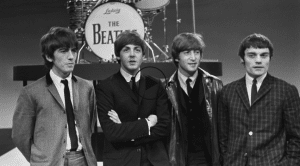
The Beatles – We Can Work It Out: A Plea for Reconciliation Amidst Conflict
In the annals of popular music, The Beatles stand as a towering icon, their music and lyrics shaping the cultural landscape of the 20th century. Among their vast repertoire, “We Can Work It Out” holds a special place, a deceptively simple song that resonates with profound emotional depth, capturing the complexities of love, conflict, and the enduring hope for reconciliation.
Background
Released in 1965, “We Can Work It Out” marked a transitional period for The Beatles, as they moved away from the youthful exuberance of their early hits towards a more introspective and mature sound. The song was written during a time of personal turmoil for both John Lennon and Paul McCartney, their partnership strained by creative differences and evolving personal lives.
Despite the underlying tension, “We Can Work It Out” radiates a message of optimism and hope. The song’s opening lines, “We can work it out / We can work it out,” serve as a beacon, offering a glimmer of reconciliation amidst the darkness of conflict.
The song’s structure is deceptively simple, with a repeating verse-chorus format that lulls the listener into a sense of familiarity. However, beneath the surface lies a depth of emotion that belies its straightforward arrangement.
Lennon and McCartney’s vocals intertwine beautifully, their contrasting voices creating a harmonious blend that mirrors the song’s message of unity. Lennon’s raspy delivery conveys a sense of urgency and determination, while McCartney’s smoother vocals offer a touch of reassurance.
The lyrics are filled with vivid imagery, painting a picture of a couple navigating the challenges of a relationship. The lines, “He said, ‘It’s dead,’ / She said, ‘No it’s not,’ / ‘Cause we can work it out, we can work it out,” capture the essence of conflict and the possibility of resolution.
The song’s bridge offers a moment of reflection, as the singer acknowledges the challenges of the situation but remains hopeful for a positive outcome. The lines, “Things are not what they seem / But we can work it out, we can work it out,” underscore the song’s central theme of perseverance and reconciliation.
“We Can Work It Out” was a commercial success, reaching number one on the Billboard Hot 100 chart in the United States and number two on the UK Singles Chart. However, its significance extends far beyond its chart performance. The song has become an enduring anthem for couples facing challenges, its message of hope and reconciliation resonating with listeners across generations.
Beyond its popularity, “We Can Work It Out” has garnered critical acclaim for its songwriting brilliance, its ability to capture complex emotions in a simple yet powerful manner. The song has been praised for its timeless message of hope and its enduring relevance in the face of human conflict.
Video
Here are some additional details about the song:
- The song was written by John Lennon and Paul McCartney.
- It was released in 1965 as a double A-side single with “Day Tripper.”
- The song reached number one on the Billboard Hot 100 chart in the United States and number two on the UK Singles Chart.
- “We Can Work It Out” has been covered by numerous artists, including Elvis Presley, Elton John, and Aretha Franklin.